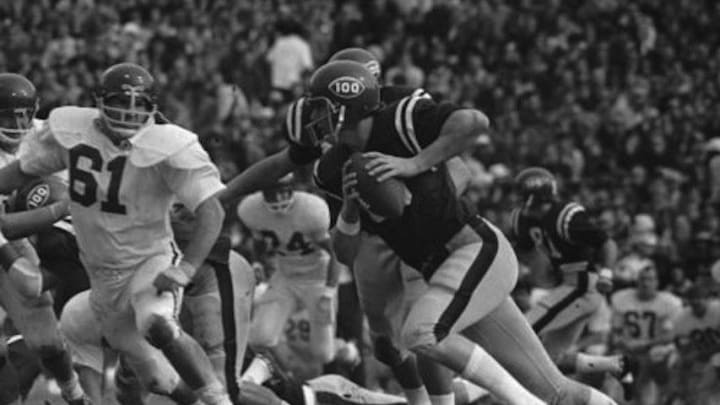50 years later, they're still talking about Alabama 33, Ole Miss 32

It was the first nationally televised night game in college football history, and some consider it one of the best ever played. If there would have been a Hollywood-type marquee outside of Legion Field on October 4, 1969, it would have read “Ole Miss at Alabama,” but the next line could only have been assigned to the starting quarterbacks, “Archie Manning vs. Scott Hunter.”
While the Crimson Tide was 2-0, it was coming off back-to-back eight-win seasons that had some fans wondering if the program might be on the decline after challenging to become the first team in major college football history to win three consecutive national titles (1964-66).
Ole Miss, the preseason favorite to win the Southeastern Conference title, was fresh off a 10-9 loss in Lexington to Kentucky.
But everyone was already well aware of Manning’s capabilities. The previous year as a sophomore, he had a 362-yard game against LSU, and helped lead a 7-3-1 season.
In one of the rare true shootouts in Crimson Tide history – and both teams wearing a 100 insignia on their helmets to commemorate the 100th anniversary of the start of college football -- Hunter completed 22 of 29 passes for 300 yards, while Manning was 33 of 52 for 436 yards and ran for 104 more. The duo combined for 842 yards of total offense, and in the process set numerous school and conference records.
Even though Bryant supposedly told his assistants they were fired numerous times while storming up and down the sideline, Alabama won 33-32 on George Ranager’s 15-yard game-winning touchdown reception with 4:32 remaining.
“After the game was over with, I was looking for Archie and found him,” Hunter said. “He had tears in his eyes. I didn’t even know what to say. I reached out, shook his hand, and he looked me in the eye.
“We didn’t have to say a thing to each other. We knew what we had done that night.”
Who remembers the 1969 Ole Miss vs. Alabama game? #RollTide pic.twitter.com/rB7OZydulw
— bryantmuseum (@bryantmuseum) September 30, 2017
Despite the victory, Alabama struggled the rest of the season, beginning with the subsequent Saturday, a 14-10 loss to Vanderbilt. For the first time since 1958, the Tide lost to both Tennessee and Auburn, and closed the year with a 47-33 defeat to Colorado in the Liberty Bowl. The 6-5 finish was the Tide’s worst record since the 5-4-1 finish in 1958, Bryant’s first at Alabama.
Ole Miss went the opposite direction, didn’t lose another Southeastern Conference game and defeated Arkansas in the Sugar Bowl, 27-22, to finish 8-3.
Manning was named first-team All-American, and finished fourth in Heisman Trophy voting (he placed third in 1970). His No. 18 was the only number retired by Ole Miss until Chucky Mullins’ No. 38 in 2006.
“I have told my boys this," said Manning, “when Eli got to Ole Miss, he was looking through the media guide and called me and said, ‘Dad, your numbers weren’t very good,’ and I said, ‘Eli, we didn’t throw the ball that much.’
“If you threw for 160 or 170 yards per game in the ’60s and the ’70s, that was a good day. That night against Alabama was kind of a freak thing.”
One that has stood the test of time.
